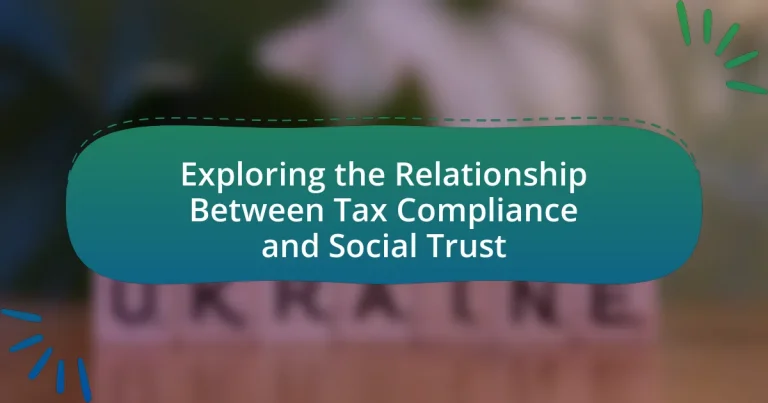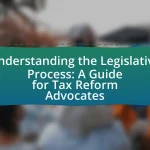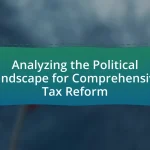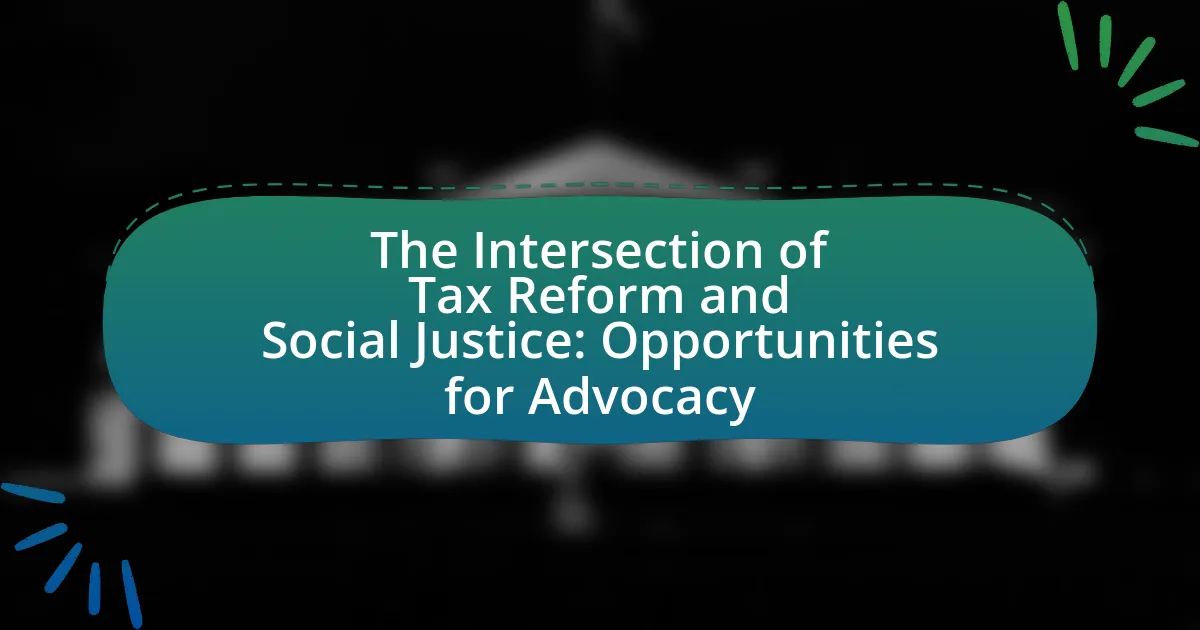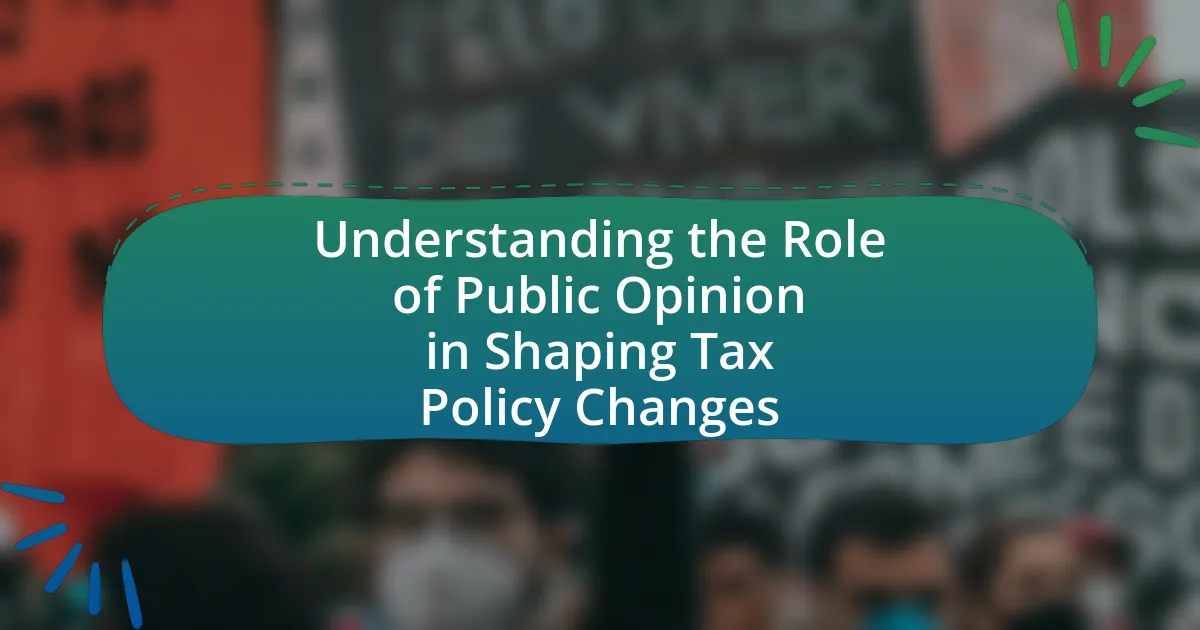The article explores the relationship between tax compliance and social trust, highlighting how higher levels of social trust correlate with increased tax compliance among individuals. It discusses the mutual influence between these two factors, where social trust enhances compliance and vice versa. Key findings indicate that perceived fairness of the tax system, effective governance, and societal norms significantly impact both tax compliance and social trust. The article also examines the implications for policymakers, emphasizing the importance of transparency, community engagement, and education in fostering a cooperative environment that promotes adherence to tax laws. Additionally, it addresses challenges such as misinformation and socioeconomic disparities that can hinder the development of social trust and compliance.
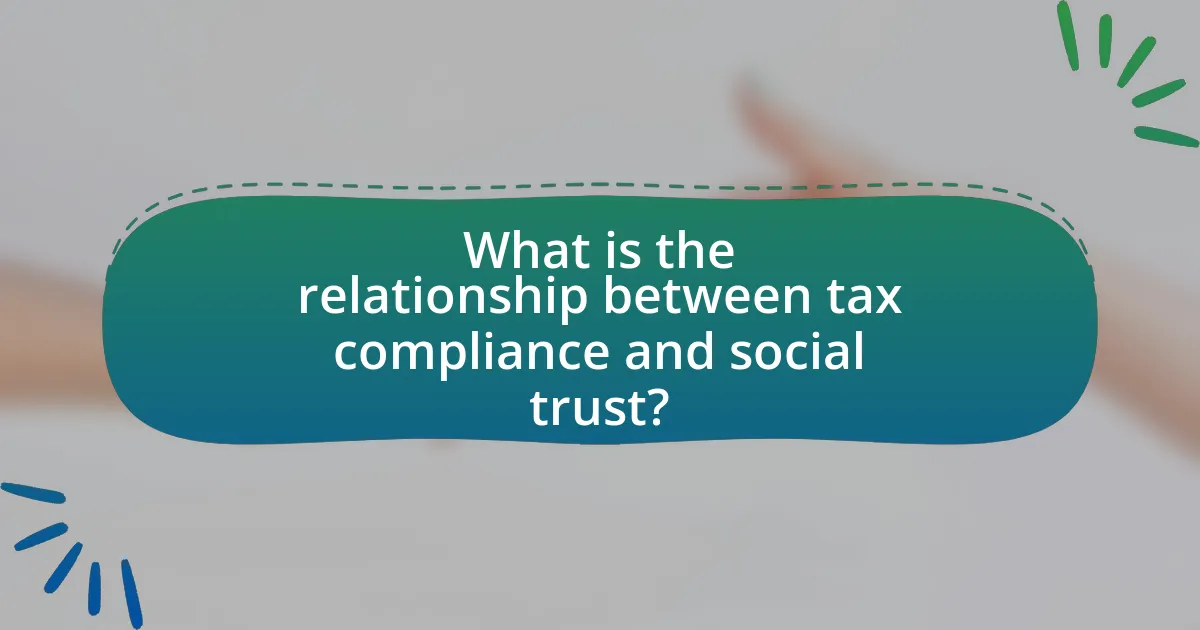
What is the relationship between tax compliance and social trust?
Tax compliance is positively correlated with social trust, meaning that higher levels of social trust often lead to increased tax compliance among individuals. Research indicates that when citizens believe in the integrity and fairness of their government and fellow citizens, they are more likely to fulfill their tax obligations. For instance, a study by Torgler (2007) found that social norms and trust in government significantly influence tax compliance behavior, suggesting that societies with higher social trust experience lower tax evasion rates. This relationship underscores the importance of fostering social trust to enhance tax compliance and ensure effective public finance.
How do tax compliance and social trust influence each other?
Tax compliance and social trust mutually influence each other, as higher levels of social trust lead to increased tax compliance, while greater tax compliance can enhance social trust. Research indicates that when citizens trust their government and fellow citizens, they are more likely to fulfill their tax obligations, as they perceive the tax system as fair and the government as competent. Conversely, when individuals comply with tax regulations, it fosters a sense of collective responsibility and trust in public institutions, reinforcing the social fabric. Studies, such as those by Torgler (2007) in “Tax Compliance and Tax Morale: A Theoretical and Empirical Analysis,” demonstrate that social trust significantly impacts tax compliance rates across various countries, highlighting the interdependent relationship between these two factors.
What role does social trust play in encouraging tax compliance?
Social trust significantly enhances tax compliance by fostering a belief in the fairness and effectiveness of the tax system. When individuals perceive that their fellow citizens are also compliant and that the government uses tax revenues responsibly, they are more likely to fulfill their own tax obligations. Research indicates that higher levels of social trust correlate with increased voluntary tax compliance, as seen in studies conducted in various countries, including the OECD, which found that nations with strong social trust exhibit lower tax evasion rates. This relationship underscores the importance of social cohesion and trust in public institutions as critical factors in promoting adherence to tax laws.
How does tax compliance affect the level of social trust in a community?
Tax compliance positively affects the level of social trust in a community. When individuals and businesses fulfill their tax obligations, it signals a commitment to the collective welfare and shared responsibilities, fostering a sense of fairness and cooperation among community members. Research indicates that higher tax compliance correlates with increased trust in public institutions, as citizens perceive that their contributions are being used effectively for public goods and services. For instance, a study by Torgler (2005) found that communities with higher tax compliance rates exhibited greater levels of trust in government, highlighting the importance of perceived equity and accountability in enhancing social cohesion.
Why is understanding this relationship important?
Understanding the relationship between tax compliance and social trust is important because it directly influences government revenue and public service funding. High levels of social trust can lead to increased tax compliance, as citizens are more likely to believe that their contributions will be used effectively for the common good. Research indicates that countries with higher social trust, such as Denmark and Sweden, experience tax compliance rates exceeding 80%, which supports the notion that trust in government correlates with willingness to pay taxes. This relationship is crucial for policymakers aiming to enhance tax systems and improve public services, as fostering social trust can lead to more sustainable economic growth and societal well-being.
What implications does this relationship have for policymakers?
The relationship between tax compliance and social trust has significant implications for policymakers. High levels of social trust can lead to increased tax compliance, which in turn enhances government revenue and the ability to fund public services. For instance, a study by Torgler (2007) found that countries with higher social trust levels tend to have better tax compliance rates, suggesting that fostering social trust can be a strategic focus for policymakers. By implementing policies that build social trust, such as transparency in government operations and community engagement initiatives, policymakers can create an environment conducive to higher tax compliance, ultimately benefiting public finance and societal welfare.
How can this understanding improve tax systems?
Understanding the relationship between tax compliance and social trust can significantly improve tax systems by fostering greater compliance through enhanced public confidence in government institutions. When citizens perceive that their tax contributions are utilized effectively and fairly, they are more likely to comply with tax obligations. Research indicates that higher levels of social trust correlate with increased tax compliance rates; for instance, a study published in the Journal of Economic Behavior & Organization found that countries with higher social trust experience lower tax evasion rates. This understanding can lead policymakers to implement transparency measures and community engagement strategies that build trust, ultimately resulting in a more efficient and equitable tax system.
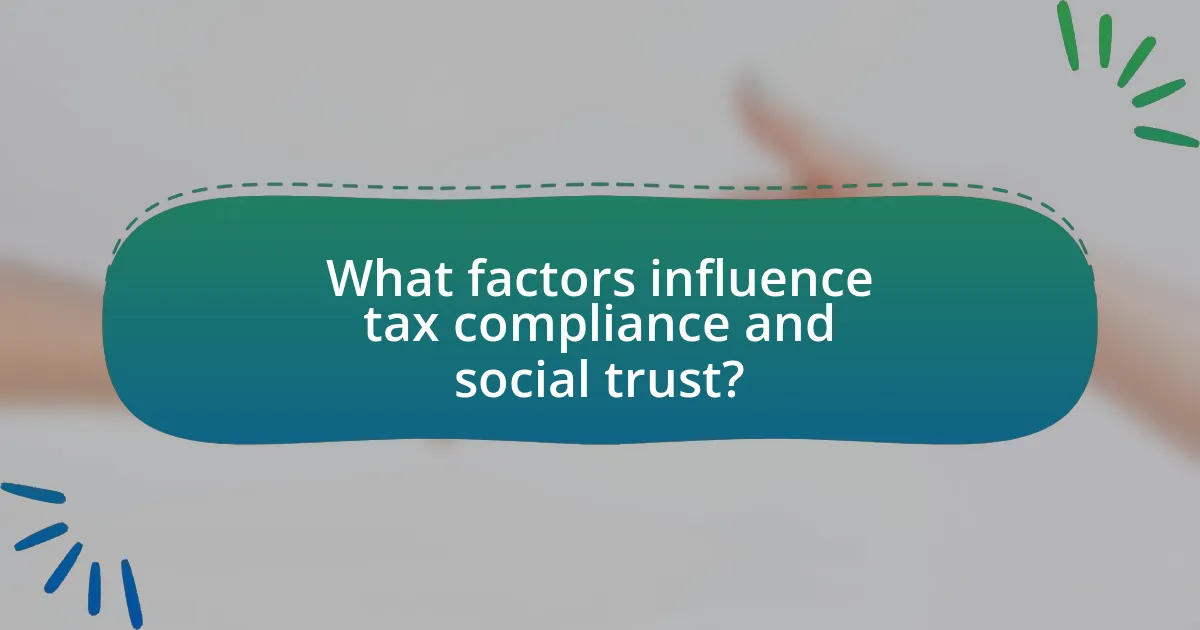
What factors influence tax compliance and social trust?
Tax compliance and social trust are influenced by several key factors, including perceived fairness of the tax system, the effectiveness of government institutions, and social norms. Perceived fairness affects individuals’ willingness to comply with tax obligations; when taxpayers believe that the tax system is equitable, they are more likely to fulfill their tax duties. Research indicates that countries with transparent and accountable governments tend to have higher levels of tax compliance, as citizens trust that their contributions are used effectively for public goods. Additionally, social norms play a crucial role; when tax compliance is viewed as a societal expectation, individuals are more likely to adhere to tax laws. Studies show that in communities where tax compliance is the norm, individuals are less likely to evade taxes, reinforcing the relationship between social trust and compliance.
How do cultural attitudes impact tax compliance?
Cultural attitudes significantly impact tax compliance by shaping individuals’ perceptions of the legitimacy and fairness of the tax system. In societies where there is a strong belief in collective responsibility and trust in government institutions, individuals are more likely to comply with tax obligations. For instance, research by Torgler (2007) indicates that countries with high levels of social trust tend to exhibit higher tax compliance rates, as citizens feel a moral obligation to contribute to the common good. Conversely, in cultures where distrust in government is prevalent, tax evasion becomes more common, as individuals may perceive tax payments as unjust or mismanaged. This relationship underscores the importance of cultural context in understanding tax behavior.
What cultural factors contribute to higher levels of tax compliance?
Cultural factors that contribute to higher levels of tax compliance include social trust, collective responsibility, and strong civic norms. Social trust fosters a belief that others will also comply with tax obligations, creating a norm of compliance within the community. Collective responsibility emphasizes the idea that individuals are part of a larger society, which encourages them to contribute fairly to public goods. Strong civic norms, often rooted in cultural values, promote the expectation that paying taxes is a moral duty. Research by Torgler (2007) in “Tax Morale and Direct Democracy” indicates that countries with higher social trust and civic engagement report greater tax compliance rates, demonstrating the significant impact of these cultural factors.
How do societal norms shape perceptions of tax compliance?
Societal norms significantly influence perceptions of tax compliance by establishing expectations around civic duty and fairness. When a community values honesty and collective responsibility, individuals are more likely to view tax compliance as a moral obligation. Research indicates that in societies with high social trust, such as Scandinavian countries, tax compliance rates are notably higher, with citizens believing that their contributions are used effectively for public goods. Conversely, in environments where tax evasion is normalized or perceived as acceptable, compliance rates tend to decline, as individuals may feel justified in avoiding taxes. This relationship underscores the importance of societal values in shaping individual behaviors regarding tax obligations.
What economic factors affect tax compliance and social trust?
Economic factors that affect tax compliance and social trust include income levels, economic stability, and perceived fairness of the tax system. Higher income levels generally correlate with increased tax compliance, as wealthier individuals often have more resources to meet tax obligations. Economic stability fosters trust in government institutions, leading to higher compliance rates, as citizens feel secure in their financial situations and believe that their taxes will be used effectively. Additionally, when the tax system is perceived as fair, with equitable distribution of tax burdens, social trust increases, encouraging compliance. Research indicates that countries with transparent tax systems and effective public services tend to have higher levels of tax compliance and social trust, as seen in Scandinavian countries where high tax rates are accepted due to the perceived benefits received in return.
How does economic stability influence tax compliance rates?
Economic stability positively influences tax compliance rates by fostering trust in government institutions and the perceived fairness of the tax system. When an economy is stable, individuals and businesses are more likely to believe that their tax contributions will be used effectively for public goods and services, leading to higher compliance. Research indicates that in countries with stable economies, such as Norway and Sweden, tax compliance rates exceed 80%, attributed to strong social trust and effective governance. Conversely, in economically unstable regions, such as parts of sub-Saharan Africa, tax compliance rates can drop below 50%, reflecting skepticism about government accountability and the use of tax revenues.
What is the relationship between income inequality and social trust?
Income inequality negatively impacts social trust. Research indicates that higher levels of income inequality correlate with lower levels of trust among individuals within a society. For instance, a study published in the American Journal of Sociology found that communities with significant income disparities often experience diminished social cohesion and increased feelings of alienation, leading to a decline in trust. This relationship is further supported by data from the World Values Survey, which shows that countries with greater income inequality report lower levels of interpersonal trust.
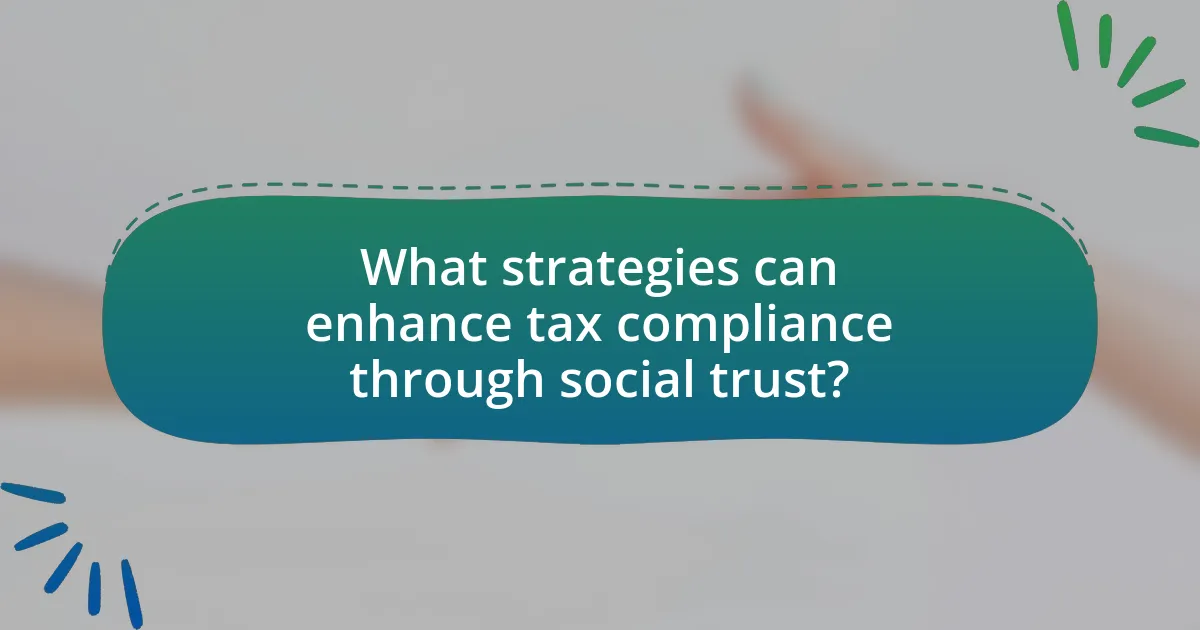
What strategies can enhance tax compliance through social trust?
Strategies that can enhance tax compliance through social trust include fostering transparency in tax administration, engaging in community outreach, and promoting social norms that encourage compliance. Transparency in tax policies and processes builds trust, as citizens are more likely to comply when they understand how their taxes are used. Community outreach initiatives, such as educational programs about the importance of tax compliance, can strengthen relationships between tax authorities and citizens, thereby increasing trust. Additionally, promoting social norms that highlight the collective benefits of tax compliance can create a culture where individuals feel a moral obligation to contribute, leading to higher compliance rates. Research indicates that countries with higher levels of social trust tend to have better tax compliance outcomes, demonstrating the effectiveness of these strategies.
How can governments build social trust to improve tax compliance?
Governments can build social trust to improve tax compliance by enhancing transparency and accountability in tax administration. When citizens perceive that their government operates fairly and uses tax revenues effectively, they are more likely to comply with tax obligations. For instance, a study by the OECD found that countries with higher levels of transparency in public finances, such as Sweden and Denmark, experience greater tax compliance rates, with compliance levels exceeding 90%. Additionally, engaging citizens in the decision-making process regarding tax policies fosters a sense of ownership and trust, leading to increased willingness to pay taxes.
What role does transparency play in fostering social trust?
Transparency plays a crucial role in fostering social trust by providing individuals with clear and accessible information about actions and decisions made by institutions. When organizations, especially governmental bodies, operate transparently, they reduce uncertainty and suspicion among the public, leading to increased trust. Research indicates that transparency in governance, such as open budget processes and public access to information, correlates with higher levels of tax compliance, as citizens feel more assured that their contributions are being used effectively and ethically. For instance, a study by the International Monetary Fund found that countries with higher transparency levels in fiscal policies experience greater public trust and compliance with tax regulations.
How can community engagement initiatives enhance tax compliance?
Community engagement initiatives can enhance tax compliance by fostering trust between taxpayers and tax authorities. When communities are actively involved in discussions about tax policies and their implications, they are more likely to understand the importance of tax compliance and feel a sense of ownership over the tax system. Research indicates that higher levels of social trust correlate with increased tax compliance rates, as individuals are more inclined to fulfill their tax obligations when they believe that their contributions are being used effectively for community benefits. For instance, a study by the OECD found that countries with strong community engagement practices often report higher compliance rates, demonstrating the effectiveness of these initiatives in building trust and accountability.
What best practices can be implemented to strengthen this relationship?
To strengthen the relationship between tax compliance and social trust, implementing transparent communication strategies is essential. Transparent communication fosters trust by ensuring taxpayers are well-informed about how their contributions are utilized, which can enhance their willingness to comply with tax regulations. Research indicates that countries with higher levels of transparency in government spending report increased tax compliance rates; for instance, a study by the International Monetary Fund found that transparency can lead to a 10% increase in tax compliance in various jurisdictions. Additionally, engaging citizens in the decision-making process regarding tax policies can further solidify trust, as participatory governance has been shown to correlate with higher compliance levels.
What are effective communication strategies for tax authorities?
Effective communication strategies for tax authorities include transparency, clarity, and engagement with taxpayers. Transparency involves providing clear information about tax laws, processes, and the use of tax revenues, which fosters trust and compliance. Clarity ensures that communications are easily understood, reducing confusion and misinformation. Engagement strategies, such as public consultations and feedback mechanisms, allow taxpayers to voice concerns and contribute to policy discussions, enhancing their sense of involvement and trust in the tax system. Research indicates that jurisdictions employing these strategies experience higher levels of tax compliance, as evidenced by studies showing a correlation between taxpayer trust and compliance rates.
How can education and outreach programs improve tax compliance?
Education and outreach programs can improve tax compliance by enhancing taxpayers’ understanding of tax laws and their obligations. These programs provide clear information about the tax system, which reduces confusion and misinformation that often lead to non-compliance. For instance, studies have shown that when taxpayers receive targeted education about tax benefits and filing procedures, compliance rates increase significantly. A report by the Internal Revenue Service indicated that outreach initiatives, such as workshops and informational campaigns, resulted in a 10% increase in filing compliance among participants. By fostering a better understanding of tax responsibilities, education and outreach programs build trust in the tax system, encouraging individuals to fulfill their obligations.
What are the common challenges in fostering tax compliance through social trust?
Common challenges in fostering tax compliance through social trust include a lack of transparency in government actions, perceived inequities in tax systems, and insufficient public engagement. Transparency issues arise when citizens feel uninformed about how tax revenues are utilized, leading to distrust in government institutions. Perceived inequities, such as the belief that wealthier individuals or corporations evade taxes, can diminish the willingness of the general populace to comply. Additionally, when governments fail to actively engage with citizens to build relationships and address concerns, social trust erodes, further complicating tax compliance efforts. These factors collectively hinder the establishment of a cooperative environment necessary for effective tax compliance.
What barriers exist in building social trust within communities?
Barriers to building social trust within communities include historical grievances, socioeconomic disparities, and lack of effective communication. Historical grievances, such as past injustices or discrimination, can create deep-seated mistrust among community members. Socioeconomic disparities often lead to unequal access to resources and opportunities, fostering resentment and division. Additionally, ineffective communication, whether due to language barriers or lack of transparency, can hinder relationship-building and mutual understanding. Research indicates that communities with high levels of inequality and unresolved historical conflicts tend to exhibit lower levels of social trust, as evidenced by studies conducted by the Pew Research Center, which highlight the correlation between economic inequality and trust levels in various communities.
How can misinformation affect tax compliance and social trust?
Misinformation can significantly undermine tax compliance and social trust by creating confusion and distrust among taxpayers. When individuals receive inaccurate information about tax laws, obligations, or benefits, they may become less likely to comply with tax regulations due to fear of penalties or misunderstanding of their responsibilities. For instance, a study by the National Bureau of Economic Research found that misinformation regarding tax credits led to a decrease in participation rates among eligible taxpayers, illustrating how false information can directly impact compliance behavior. Additionally, widespread misinformation can erode social trust, as individuals may perceive the tax system as unfair or corrupt, leading to a collective reluctance to engage with tax authorities. This erosion of trust can be evidenced by surveys indicating that communities with higher levels of misinformation report lower levels of trust in government institutions, further exacerbating compliance issues.
